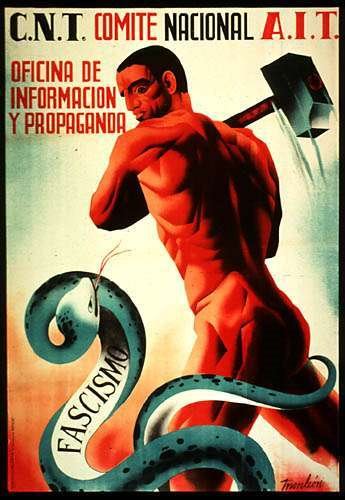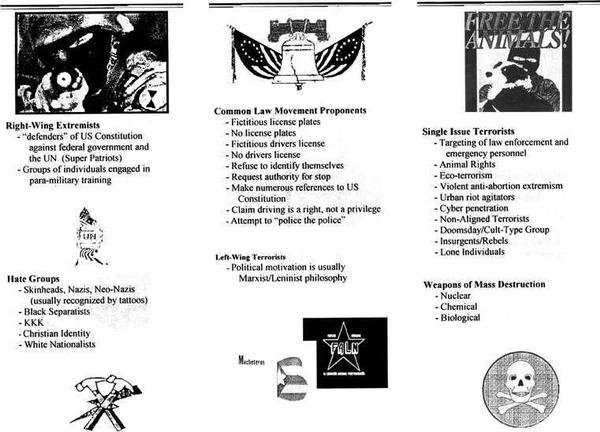this is exactly why we should reject net neutrality type bills. what the government can regulate, it can control. learn from history, folks, and don't give in to the hype! ron paul voted against the so-called "net neutrality" bill for the same reason he voted against the so-called "patriot act". it is more orwelian double-speak that invites more big government where it ought not be--and it should fool no one. read the actual bill before you endorse it!
FF Classic: The Thought Police Have Arrived
Category: News and Politics

Hello Freedomphiles! Boy, has my Tittygate essay put me on some shitlists. Everyone and their mother wants to tell me why the FCC has a right to violate the First Amendment daily. So, once and for all, for anyone interested, I am going to take a few minutes to explain the where's and why's of the Supreme Court's justification for such actions, and of course, blow them into fucking smithereens.
Let's start at the beginning...
What we are talking about here is what the Supreme Court considers indecency. The legal difference between obscenity and indecency was defined in the 1973 case Miller v. California, which defined obscenity as "patently offensive" material, with no "significant scientific, literary, artistic, or political value." This is otherwise known as the SLAP standard. Now, indecent material would still be "patently offensive," but would have some SLAP value. This is the category that Stern fits into. So, "Fuck me" is out, but "Fuck the FCC" will just get you fined.
Historically, this definition of indecency has been used, according to Jonathan D. Wallace, co-author of Sex, Laws, and Cyberspace "to prosecute writers and publishers of controversial novels (including the works of Balzac, Tolstoy, Zola, and Joyce), along with early crusaders for women's sexual independence, abortion rights, and birth control." You know, those Down With Love girls.
Now, from the beginning, the rationale for censoring the airways has been the bizarre idea of "spectrum scarcity." The thinking goes that since the broadcast spectrum is a scarce resource, the government has the right to appropriate it, dole it out, and regulate content. This is the weakest of all arguments, as anyone whose been to even the first day of an economics class knows that all resources are necessarily scarce, including those to make books and newspapers.
This thinking provides perhaps justification to regulate the use of the airwaves (I disagree, but that's another Freedom File), but not the justification to offer lower First Amendment protections to its users. The argument, in a nutshell, is that since they took the airwaves to facilitate efficient use, it is now theirs, and they can regulate its content as well. As Wallace asks, "Why should technical distinctions be the basis for different treatment under the First Amendment? What would be the rationale, say, for regulating printed books more strictly than books on parchment or papyrus?"
The Supreme Court tried to clear this matter up a bit and gave themselves some sort of groundwork for the censoring function of the FCC in their flawed ruling on 1978's Pacifica Foundation v. FCC. Ironically, this case was over WBAI-FM's playing of George Carlin's seven dirty words monologue against FCC censorship.
Their ruling stated that the most prescient justification for the censoring ability was that radio was "pervasive," that "the broadcast media have established a uniquely pervasive presence in the lives of all Americans. Patently offensive, indecent material presented over the airwaves confronts the citizen, not only in public, but also in the privacy of the home, where the individual's right to be left alone plainly outweighs the First Amendment rights of an intruder." Never mind that we must first buy, then turn on, then tune any radio before we can receive these broadcasts, essentially the same thing as buying, opening, and reading a book. Or inviting someone into your home who turns out to be offensive to you. What do you do then? You kick the bastard out. In the case of radio, you use the opposable thumbs God gave you to turn the fucking dial.
But this justification is not new. It was used by King François I in the 1530s to destroy printers and ban printed books, as the danger of print to spread ideas quickly was threatening to him - print media was pervasive.
In his dissent to Pacifica v. FCC, Justice William Brennan rightly noted its rationale "could justify the banning from radio of a myriad of literary works, novels, poems and plays by the likes of Shakespeare, Joyce, Hemingway." Not only those literary works, but at the time current politically controversial items "such as the Nixon tapes." Even the Bible was not safe, he argued, as I Samuel 25:22, where King David says "So and more also do God unto the enemies of David, if I leave of all that pertain to him by the morning light any that pisseth against the wall." [Emphasis mine]
The Court was not swayed by such arguments, reason being their enemy, and were not overly concerned because the worst the FCC could do at the time was put a letter of sanction in Pacifica's file. Of course, this could become more pertinent when Pacifica tried to renew it's license for WBAI. Since that time, of course, the penalty has gone from a chiding letter to a $500,000 fine.
The majority opinion also argued, as many of my would-be detractors have, that since the "seven dirty words" rule was narrowly defined, broadcasters could easily find other words to use to make the same point, ignoring the fact that Carlin's point, which was political speech, could not have been made without using those seven words!
Enter Howard Stern, and the era of double-entendres and innuendo. Using the Court's definition of indecency and the "seven dirty words" rule, "shock jock" Stern and scores of imitators spoke frankly about sex without running afoul of the FCC.
But the FCC showed it's true stripes in response, revealing it wasn't really the word choice that got them, but the content. It wasn't the words they wanted to ban, but the thoughts. Even Stern's adherence to their newspeak did not protect him, because he was having unapproved thoughts. The FCC expanded it's indecency regulations in 1986 to include "patently offensive" language describing sexual or excretory acts or organs, and as a result, eventually fined Infinity, the show's syndicators, $2 million.
As a result of these confusing and arbitrary standards, stations don't know what will be deemed indecent and what will make it by. Could they play the Nixon tapes, filled with racial slurs and obscene language, or would that meet the SLAP test? "That is bound to have a chilling effect on programming, because broadcasters have to anticipate what the FCC will consider indecent, and even material with a serious point can run afoul of the rules," says Wallace.
This brings us to today's problem, kicked off by Tittygate, whereupon broadcasters, fearing these huge fines and FCC harassment, have gone to great lengths to avoid the wrath of these amped-up censors. Stern's show has been dropped from profitable markets, and Emmis Communications and Clear Channel have adopted a much stricter guideline and zero tolerance policy for their on-air talent because "federal guidelines on indecency are vague."
Vague enough to present a real threat to other industries, as well. First Amendment attorney Robert Corn-
Revere rightly deduces that "the pervasiveness doctrine empowers government to exert greater control over a medium of communication to the extent it is universally available and influential. By this logic, the printing press should be subject to intensive regulation, since few media are as pervasive as print. Such reasoning is antithetical to the First Amendment."
Indeed. And the bitter irony of it all is that the goal of all media is to reach a larger and larger audience, to become more and more pervasive. So, a necessary result of success is a weakening of their First Amendment rights. As Wendy McElroy, president and founder of iFeminists, said, "Taken to its logical conclusion, the pervasiveness argument would prohibit anyone standing on a public street from discussing...controversial matters. The open air might well transmit the discussion through the open windows of nearby houses, businesses, and apartments. One might reply, `Let them close the window.'"
Or turn the dial.
So, I reiterate. Fuck the FCC.
Until Next Time, Make Every Day a Good One!
- Rick


 Major media outlets have denied fund raising reports, rally attendance, and record breaking internet support as the work of a small secretive group of Ron Paul supporters conspiring to defraud the public. Is it time for them to give up this conspiracy theory before they lose credibility?
Major media outlets have denied fund raising reports, rally attendance, and record breaking internet support as the work of a small secretive group of Ron Paul supporters conspiring to defraud the public. Is it time for them to give up this conspiracy theory before they lose credibility?

 Ron Paul Factor: Polling Data Flawed
Ron Paul Factor: Polling Data Flawed


